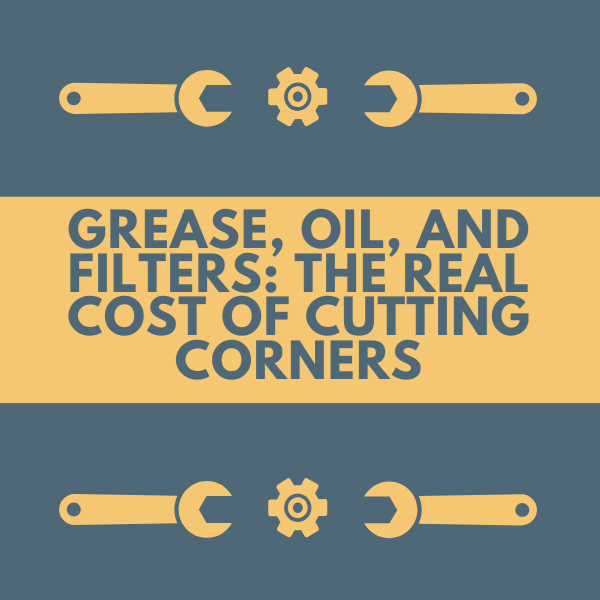Iron Insights
Grease, Oil, and Filters: The Real Cost of Cutting Corners
When it comes to running heavy iron, every operator knows that uptime is money. Machines that sit idle because of mechanical failures don’t just rack up repair bills — they stall projects, drain productivity, and eat away at margins. One of the biggest traps equipment owners fall into is trying to save a few dollars on grease, oil, and filters. But cutting corners here doesn’t save money — it sets you up for expensive breakdowns later.
Grease: The First Line of Defense
Pins, bushings, and joints are the contact points that keep your machine moving. Grease is more than just lubrication — it’s a protective barrier against metal-on-metal wear and contamination.
- Cheap grease often breaks down faster under heat and pressure, forcing metal parts to grind against each other.
- Skipping greasing intervals accelerates wear, leading to sloppy linkages, seized joints, and costly rebuilds.
- The real math: A $10 tube of high-quality grease can prevent a $10,000 replacement of a boom or stick component.
Oil: The Lifeblood of the Engine and Hydraulics
Engines and hydraulic systems are unforgiving when oil is neglected. Viscosity, additives, and contamination resistance all matter.
- Engine oil protects against friction, heat, and soot buildup. Run cheap oil too long, and you’re looking at scored cylinders or bearing failure.
- Hydraulic oil doesn’t just transmit power — it cools and cleans the system. Inferior fluid or stretched intervals can cause cavitation, pump damage, or valve wear.
- The real math: A $500 oil change done on schedule can prevent a $25,000 engine overhaul or a $40,000 hydraulic system replacement.
Filters: The Unsung Heroes
A filter may seem like a simple part, but its role is mission-critical.
- Air filters protect combustion chambers from dust and grit. One clogged filter can cause reduced power, poor fuel economy, or even turbocharger failure.
- Fuel filters catch particulates and water before they damage injectors. Skipping them risks injector rebuilds that cost thousands.
- Hydraulic and oil filters trap metal shavings, sludge, and contaminants. Without them, the system circulates abrasive particles like sandpaper.
- The real math: A $150 filter change can stop a $15,000 fuel system rebuild dead in its tracks.
Why Operators Notice First
Seasoned operators often hear or feel the difference before a machine tells you on the gauge cluster. A sluggish boom, a noisy pump, or a hot engine are usually symptoms of skipped maintenance. Operators who take pride in greasing daily, checking oil levels, and swapping filters on time don’t just protect the machine — they protect the crew and the schedule.
Maintenance Is Profit
Trying to save a few bucks on fluids and filters is false economy. The “savings” are an illusion — what you’re really buying is downtime, premature wear, and catastrophic failures that hit six figures before you know it.
Every contractor knows margins are thin. But those who treat grease, oil, and filters as investments — not expenses — keep machines running smoother, longer, and stronger.
The real cost of cutting corners isn’t the price of maintenance — it’s the price of failure.

